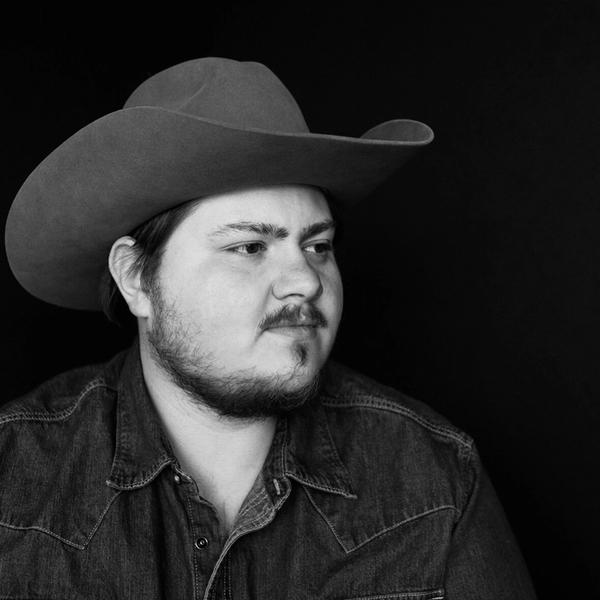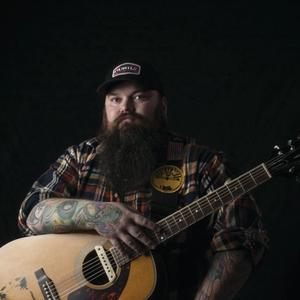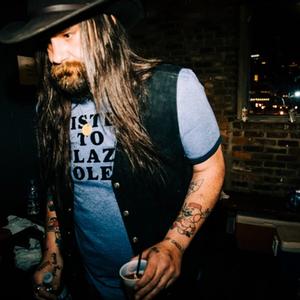




Link copied

“Rodney Crowell called me a disciple of Townes [Van Zandt], Guy Clark and himself, but I don't know about that title,” says Texas songwriter Vincent Neil Emerson. There's a touch of apprehension and hesitation in his voice, as if he's slightly uncomfortable with the high praise from the country legend. Still, a ray of satisfied pride sparkles across his face as he continues talking on the other end of the call.
"Guys like me, we're trying to carry on the tradition of Texas folk music. I can't say whether I'm doing the best job of it or not, but I'm here doing it," he adds. "I'm telling my truth to the world."
Crowell, who produced Emerson's sophomore album - the intensely raw Vincent Neil Emerson - is right on the money about the modern-day Texan torchbearer. After years of writing storytelling character sketches and honky-tonking barnstormers - culminating in his breakthrough album Fried Chicken & Evil Women - Emerson delivers one of the finest collections of autobiographical songs, delving into vulnerability, trauma, mental health and change.
Like Clark, Van Zandt and Crowell, Emerson blends straightforward introspection and plainspoken poetry with elegance and warmth. Even while grappling with difficult subjects and uncomfortable truths, Emerson's vocals and pen are comforting and inspiring.
On the especially devastating ‘Learning to Drown’, a song that addresses Emerson's father's suicide, he possesses a brave vulnerability. It captures Emerson at different points in his life, as he continues to process the grief, trauma, and emotional scarring of the experience. "I spend my whole life wondering why I'm down / I don't feel easy if the blues don't come around and my face don't look right without a frown / Well, if you can't swim, you better learn to drown", he sings on the standout, sad bastard song.
Yet on ‘High on Gettin’ By’, he’s self-aware, humbled, and hopeful. Elsewhere, like on the opening ‘Texas Moon’, the bluegrass-tinged ‘High on the Mountain’, and rambler blues ballad ‘Ripplin’ and Wild’, Emerson showcases his lyrical prowess while narrating his struggles with conformity, heartache, balancing family life and time out on the road.
So even while Vincent Neil Emerson often finds him dealing with heartache, grief and doubt, above all else it finds him resilient, tough and still standing. He carries on.

You wrote most of this album in the past year during quarantine, since touring and shows came to a standstill. Was there a particular song that felt like a turning point or moment where you could see what direction the album was taking?
I guess ‘High on Gettin' By’ was that song. It was the first that I wrote for the record, and when I sat down to do it, I did have a moment of realization. There's a lot of stuff to think about. It's more than just the quarantine; it was looking back at my whole life and trying to put my story into perspective.
On your previous album, Fried Chicken & Evil Women, you could find moments that were informed by your life and experiences, but they were much more characterized by a storytelling, honky-tonk flavor. The songs of Vincent Neil Emerson are undoubtedly your most autobiographical to date - did you feel they needed more of a Texas folk palette to possess the proper context and feel?
For sure. We couldn't make this into a honky-tonk record. We just tried to fit the instrumentation around the songs and to not to flavor anything too much. It's like when you have a good steak - you don't need to put anything on it.
Rodney Crowell produced the album. What were those initial conversations with him like?
When I sent him the new songs, he knew right off the bat exactly what this was about. We had an unspoken understanding. I think he asked how I felt about a stripped-down production, and I said yep. We talked about songs and songwriting and he was encouraging me the whole way. I wrote a couple of songs after he signed on to make the record; he was just guiding and helping me. He's been a mentor and a friend.
One of my favorite themes on the album is this tug of war conversation you have about being a traveling musician and a family man, and how both pull at you for their attention. I'm not sure if that was intentional, but you do get a great sense of that struggle.
Yeah, there's a desire to be doing both. I think it's a struggle to maintain relationships with people through that. That's something I was thinking about a lot while writing those songs. As traveling musicians, we have to be away from people we love, and sometimes they don't always understand or accept it.
The first song from it is ‘Learning to Drown', where you talk about the death of your father, processing the trauma and emotions, and even how they relate to your own thoughts about suicide. You've mentioned how writing that song has been cathartic. Why do you feel you were able to get to a point to write it?
I think it just took time for me to try and figure myself out. On the last record, I was writing story songs; they were characters moving through the world. With this album, I wanted to tell my story, that's why it's self-titled.
I needed to write ‘Learning to Drown'. I tried to write it four or five times before, in different forms, melodies, structures - even different ideas about it - but nothing ever felt right. Finally, I stopped trying to write about it. I sat down to write a song and just let the words come to me in a stream of consciousness. That's when it started hitting me. You know, I started writing a song about nothing and not really having an idea, and then, all of a sudden, I'm writing about one of the most dramatic events in my life. Sometimes you’ve just got to let it come to you.
'The Ballad of the Choctaw-Apache' is a song that has ties to you and your family, but is also a true story about Indigenous people being marginalized by the US government. There's a history of that happening, but this song was specifically inspired by events in the early 1960s. When did you first hear about this story?
My mother's side of the family are from Northwest Louisiana, up near Ebarb and Converse. I was really just learning about the history of the tribe and what they went through. As an adult, I've tried to reconnect with that and as I was researching everything, I found out about everything that had happened to them that nobody talks about. My family never even talked about it. I felt like it was something that needed to be written for them - for my native side of the family and all the people who are a part of that community.
I think you have a genuine and keen sense of self-awareness in your songwriting. A lot of songwriters can be introspective and highly contemplative, but it feels like when you're talking or writing about your life, you have a particular way of addressing some of the destructive tendencies and fears in life.
I think everybody deals with that kind of shit. I've been trying to focus on being as honest as possible, because I wasn't for a while. Not in a bad way or anything - I was just writing story songs about other people's lives and just letting my feelings slip in there between the cracks. That's fun and there's something cool about it, but I think what I'm doing now is a little more rewarding.
I've always thought that songwriting is the best form of therapy. You'll hear lots of people say that about songwriting and it's true. If you can get those feelings out there, if you can share something, you're not only helping yourself, but you're helping someone else who may be going through the same thing. There's nothing better than putting on a song and feeling like it’s about your entire life.
Vincent Neil Emerson’s self-titled sophomore album is out now via La Honda Records /Thirty Tigers. Watch the video for 'Texas Moon' below.
Vincent is the featured artist on Holler's Introducing playlist this week. Subscribe and listen below.







